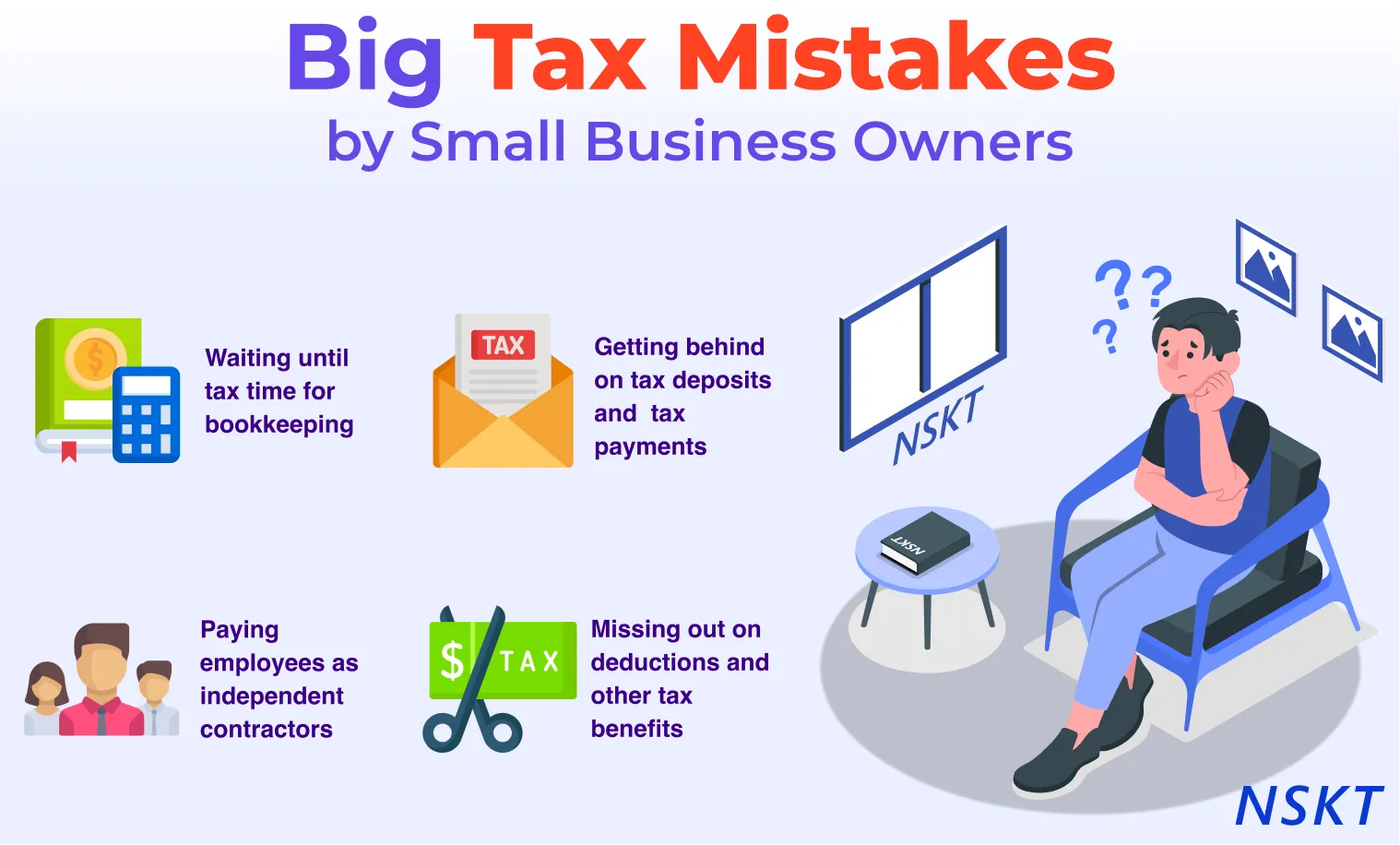Table of Contents
Every small business lacks the experience and expertise to handle everything on its own. Along with this, there are also money constraints because of which they cannot hire employees or outsource every service.
Small businesses often make mistakes in taxes, which need to be avoided at any cost. Listed below are some big tax mistakes small business owners make:
- Choosing the wrong form of business- Choosing the wrong form of business can create significant challenges when it comes to tax filing services and tax filing itself. There is no one-size-fits-all business structure that seamlessly handles all tax-related aspects. Often, in the rush to launch their business quickly, owners hastily select a business entity by checking a box on the registration form that seems appropriate at the time, without a clear understanding of the tax implications and benefits associated with it. It's only when they go to file their tax return or apply for a loan that they discover they have set up their entity incorrectly, requiring them to address these issues during the tax filing process.
- Missing deadlines- Taxes are hardly on mind when running a small business. There are a million other things to do, so the owners can easily forget about the deadline for the taxes. But If taxes are not paid on time, business is apt to be levied penalties. In cases when the taxes are late, and you have a valid explanation for missing the deadline — you can request a tax-filing extension from the IRS to give you a little more time and avoid the penalties. Though it’s a free service, it entails way more formalities than filing a tax return.
- Not paying estimated taxes - Small businesses need to pay an estimated $1,000 or more tax when their return is filed to the IRS. But, paying these quarterly taxes throughout the year is the bane of many business owners, who may either fail to comply or underestimate taxes and end up owing penalties. To pay the estimated taxes, they can use Form 1040-ES to figure out the estimated taxes. But make sure to account for all of the taxes you will owe — including the self-employment tax, social security, and Medicare taxes.
- Not claiming the right business deductions- Many small business owners neglect to take advantage of certain deductions unless they have a good understanding of tax codes and miss out on the opportunity to save money. In many cases, small business owners pay more tax than they owe. The IRS allows certain deductions for small businesses in the U.S., including advertising, business meals, office furniture and supplies, insurance, startup expenses, travel expenses, licenses, etc. Be active while planning your taxes and figure out which deductions your business qualifies for so you minimize your tax bill.
- Mixing business and personal expenses- Blurring the lines between personal and business finances can create a tangled web that can be challenging to untangle when it's time to engage in tax filing services. To streamline the tax filing process and ensure accurate reporting, it is highly advisable to maintain distinct accounts and credit cards for your business expenses and personal finances. This clear separation not only simplifies the tax filing services you may require but also facilitates the tracking of deductible expenses, making the entire tax filing process more efficient and less prone to errors.
| Common Tax Mistakes Small Business Owners Should Avoid | |
| Mistake | Explanation |
| Failing to Consult a Tax Professional | The tax code is complex, and it's easy to overlook deductions and credits. Consulting with a tax professional can ensure you maximize tax benefits while staying compliant. |
| Ignoring Retirement Planning | Failing to plan for retirement can lead to missed tax-saving opportunities. Consider setting up a tax-advantaged retirement plan for your business. |
| Not Keeping Updated with Tax Law Changes | Tax laws can change frequently. Staying informed about tax law updates ensures you remain in compliance and can adapt your tax strategy accordingly. |
| Ignoring Record-Keeping Best Practices | Failing to keep accurate financial records can lead to missed deductions and compliance issues. Invest in accounting software or hire a bookkeeper to ensure proper record-keeping. |
| Utilizing Tax Credits | Small businesses may be eligible for various tax credits, such as the Research and Development (R&D) credit or the Work-Opportunity Tax Credit. Investigate potential credits to reduce your tax liability. |
NSKT Global is a consulting firm that helps businesses file taxes with all the possible deductions. Though businesses have to file taxes once a year, the process can be complicated. So, one of the best things a small business can do is outsource the tax services from NSKT Global to get the best tax services for your small services.



